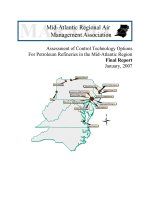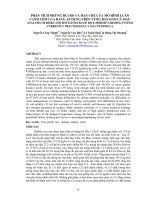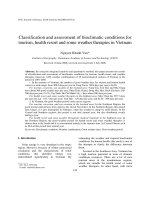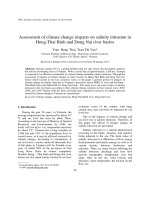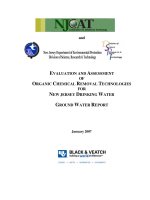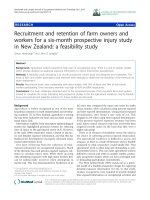Mechanization gap and assessment of farm mechanization requirement for each operation in different crops
Bạn đang xem bản rút gọn của tài liệu. Xem và tải ngay bản đầy đủ của tài liệu tại đây (136.31 KB, 4 trang )
Int.J.Curr.Microbiol.App.Sci (2018) 7(12): 1213-1216
International Journal of Current Microbiology and Applied Sciences
ISSN: 2319-7706 Volume 7 Number 12 (2018)
Journal homepage:
Original Research Article
/>
Mechanization Gap and Assessment of Farm Mechanization Requirement
for Each Operation in Different Crops
P. Nagarjuna Reddy* and Jagadeesh G. Angadi
1
Department of Agricultural Extension Education, UAS, Dharwad-580005, India
*Corresponding author
ABSTRACT
Keywords
Mechanization gap,
Paddy, Maize and
pigeon pea
Article Info
Accepted:
12 November 2018
Available Online:
10 December 2018
Mechanization gap and assessment of farm mechanization requirement for each operation
in different crops of Karnataka was measured and analyzed. Data was gathered from a
sample of 240 farmers in which paddy, maize and pigeon pea growers constituted 80 each.
The mechanization gap in paddy for combine harvester and paddy reaper was 100.00 per
cent and 77.00 per cent respectively that amounts to requirement of 4 combine harvesters
and 7 paddy reapers. In maize, equipment-wise gap for M B plough, cultivator, rotovator
and disc harrow was 23.00 per cent, 50.00 per cent, 33.33 per cent and 25.00 per cent
respectively that amounts to requirement of 6 M B ploughs, 11 cultivators, 7 rotovators
and 4 disc harrows. The mechanization gap for combine harvester of pigeon pea was
100.00 per cent that amounts to requirement of 4 combine harvesters.
Introduction
The farming scenario of Indian agriculture is
changing day by day. The Indian scenario
relating to use of farm machineries in various
region differ significantly from each other.
The use of machine in farming greatly
depends on the soil type and the crop grown in
the particular soil. Based on such argument
many research and development agencies
impart in development of soil and crop
specific farm machineries and implements in
India. The mechanization refers as the use of
farm machineries in crop production
operations as land preparation, residue
management, plant protection, harvesting,
threshing of crop and use of power for the
various operation viz., irrigation, etc. (Karale
et al., 2008). The adoption of machine in
farming operation is increasing day by day as
it resulted in saving of cost of production and
increasing net income of the farmers (Singh,
2006). An attempt was made to find the gap of
farm mechanization with a view to suggest the
future requirement of mechanization.
Materials and Methods
The present study was conducted in Karnataka
during the year 2016-17. Based on cropping
pattern thee districts Uttar Kannada, Belgavi
and Vijayapura were selected for paddy,
maize and pigeon pea crops respectively.
From each district two taluks were selected
and from each taluk two villages were
selected. From each village 20 farmers were
1213
Int.J.Curr.Microbiol.App.Sci (2018) 7(12): 1213-1216
selected comprising 10 large farmers and 10
small farmers using stratified random
sampling thus making a total of 240 as the
sample size. Personal interview method was
followed for data collection using a interview
schedule developed for the study. Statistical
tools Frequency and percentage have been
used for the study.
Mechanization gap
Mechanization gap is the difference between
the
required
number
of
farm
machinery/equipments and the actual number
of farm machinery/equipments available.
Farm mechanization requirement
The mechanization requirement of study area
was determined considering the machinery
and mechanical power utilized over the land
cultivated. The mechanization requirement has
been found out with as follows:
WC × TA
Farm Mechanization Requirement:————
TH
Where,
WC
=
Working
capacity
of
machinery/equipment per ha
TA = Total area of the cultivated land
TH = Total no. of hours the operation was
performed in a season
Results and Discussion
Mechanization gap and assessment of farm
mechanization requirement for each
operation
The farm machinery requirement and gap was
assessed in paddy, maize and pigeon pea for
the sample of 80 farmers each. Based on
working capacity of implement/machinery per
acre, total cultivated land area and total
number of hours the operation was performed
in a season, requirement of
implement/machinery was calculated.
farm
Mechanization gap and requirement of farm
machinery for each operation is presented in
Table 1. In paddy, equipment-wise gap in land
preparation operation was 25.00 per cent,
64.70 per cent and 43.75 per cent that amounts
to requirement of 5 M B ploughs, 11
cultivators,
7
rotovators.
In
sowing/transplanting operation, the gap was
37.50 per cent and 80.00 per cent that amounts
to requirement of 3 seed-cum-fertilizer drills
and 7 paddy transplanters. The gap was
100.00 per cent and 77.77 per cent that
amounts to requirement of 4 combine
harvesters and 7 paddy reapers in harvesting
operation. While, in threshing, the gap was
33.33 per cent that amounts to requirement of
2 multicrop threshers.
In maize, equipment-wise gap in land
preparation was 23.00 per cent, 50.00 per cent,
33.33 per cent and 25.00 per cent that amounts
to requirement of 6 M B ploughs, 11
cultivators, 7 rotovators and 4 disc harrows. In
sowing operation, the gap was 31.25 per cent
that amounts to requirement of 5 seed-cumfertilizer drills. The gap was 100.00 per cent
that amounts to requirement of 5 combine
harvesters in harvesting operation. While, in
threshing operation, the gap was 12.50 per
cent that amounts to 1 multicrop threshers.
Equipment-wise gap in land preparation was
8.69 per cent, 36.84 per cent, 66.66 per cent
and 35.71 per cent that amounts to
requirement of 2 M B ploughs, 7 cultivators,
12 rotovators and 5 disc harrows in pigeon
pea. In sowing operation, the gap was 35.71
per cent that resulted in a requirement of 5
seed-cum-fertilizer drills. The gap was 100.00
per cent that amounts to requirement of 4
combine harvesters in harvesting operation.
While, in threshing operation, the gap was
28.57 per cent that resulted in a requirement of
2 multicrop threshers.
1214
Int.J.Curr.Microbiol.App.Sci (2018) 7(12): 1213-1216
Table.1 Mechanization gap and farm machinery/equipment requirement
Sl.
No.
1.
2.
3.
4.
Operation
Land
preparation
Sowing/
transplanting
Harvesting
Threshing
Farm
machinery
and
equipment
M B Plough
Paddy
Maize
Pigeon pea
Required
Available
Gap
F (%)
Required
Available
Gap
F (%)
Required
Available
Gap
F (%)
20
15
26
20
21
17
6
22
11
19
12
Rotovator
16
9
21
14
18
6
Disc harrow
14
7
16
12
6
(23.00)
11
(50.00)
7
(33.33)
4
(25.00)
23
Cultivator
14
9
2
(8.69)
7
(36.84)
12
(66.66)
5
(35.71)
Cage wheel
10
5
-
-
-
-
Seed-cumfertilizer
drill
Paddy
transplanter
Combine
Harvester
Paddy
reaper
Multicrop
Thresher
8
5
5
(25.00)
11
(64.70)
7
(43.75)
7
(50.00)
5
(50.00)
3
(37.50)
16
11
14
9
10
2
-
-
-
-
4
0
5
0
4
0
9
2
-
-
-
-
6
4
8
(80.00)
4
(100.00)
7
(77.77)
2
(33.33)
8
7
7
5
F: Frequency
%: Percentage
1215
5
(31.25)
5
(100.00)
1
(12.50)
5
(35.71)
4
(100.00)
2
(28.57)
Int.J.Curr.Microbiol.App.Sci (2018) 7(12): 1213-1216
In all three crops, viz., paddy, maize and
pigeon pea, mechanization gap and farm
machinery requirement was found high for
harvesting operation. Due to financial and
technical non-viability, mechanization gap
was high in harvesting operation. Farmers can
afford to purchase implements like M B
plough, cultivator, disc harrow but, they
cannot afford to purchase high cost machinery
like combine harvester. The results are in line
with the findings of Umesh (2012).
Government should provide each of this high
cost machinery to a cluster of custom hiring
centers.
The requirement of cultivators and rotovators
was found high in all three crops for land
preparation
operation.
Cultivator
and
rotovator are the primary and secondary
tillage equipments. Availability of these
equipments through custom hiring centers in
required number based on the proportion to
the cultivated area facilitates the farming
community to go for mechanization.
In conclusion, mechanization gap and farm
machinery requirement was found high in
paddy compared to maize and pigeon pea.
Compared to maize and pigeon pea,
cultivation of paddy has more scope for
mechanization because specific implements/
machinery are required for each operation like
cage wheel for puddling and paddy
transplanter for transplanting. There is a need
to reduce the gap and equip the custom hiring
centers with farm implements/ machinery in
proportion to the total cultivated area.
References
Karale, D.S., Khambalkar, V. P., Bhende, S.
M., Amale, Sharddha and Wankhede,
Pranali (2008). Energy economic of
small
farming
crop
production
operations. World J. of Agril. Science, 4
(4): 476-482.
Singh, Gyanendra (2006). Estimation of a
mechanisation index and its impact on
production and economic factors—a
case study in India. Biosystems
Engineering, 93(1): 99–106.
Umesh, M., 2012, Mapping of mechanization
needs and gaps of rice growers in
Raichur district of Karnataka. M. Sc.
(Agri.) Thesis, Univ. Agric. Sci.,
Dharwad, Karnataka (India).
How to cite this article:
Nagarjuna Reddy, P. and Jagadeesh G. Angadi. 2018. Mechanization Gap and Assessment of
Farm Mechanization Requirement for Each Operation in Different Crops.
Int.J.Curr.Microbiol.App.Sci. 7(12): 1213-1216. doi: />
1216
